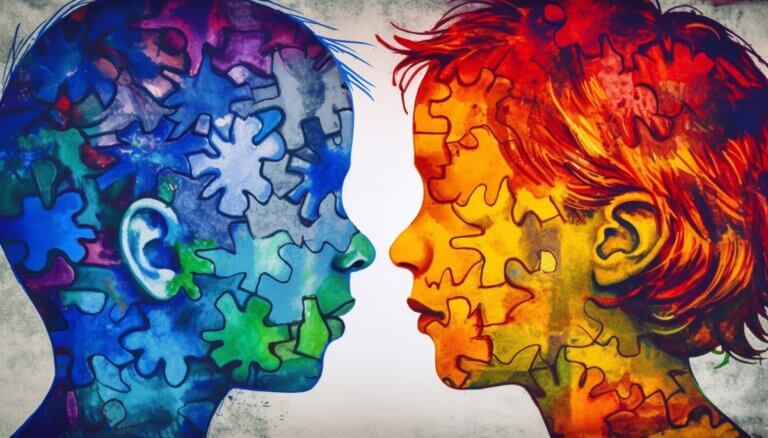Table of Contents
Basic Principles of Emotional Intelligence

Self-awareness and Self-management
Emotional intelligence is the connective tissue that links interpersonal relationships, leadership success, and the development of a Corporate Culture of Emotional Intelligence. It allows us to dive deep into the sea of our emotions and navigate wisely from there.
Self-Awareness – The Alpha and Omega of Emotional Intelligence
The ability to recognize and understand one’s own emotions is an art that needs to be practiced. For instance, a manager notices his increasing irritability towards his team during stressful projects. This awareness allows him to take proactive measures to maintain a balanced atmosphere – such as taking breaks or having open discussions. He also demonstrates his responsibility for culture promotion by showing: ‘I know myself and I care for a positive environment.’
Authentic Self-Management as the Key
Self-management in emotional intelligence means always keeping a firm grip on the helm, even when the emotional seas get rough. A leader who remains calm and provides constructive feedback instead of criticism after a disappointing quarterly result builds trust and motivation. This behavior is essential for Emotional Intelligence in Corporate Development and creates a Positive Work Culture.
The consonance of self-awareness and self-management forms the core of emotionally intelligent leadership and thus also a healthy ‘Leadership and Culture’. Those who master these tools not only play solo parts but also tune a harmonious symphony of human interaction.
The Importance of Social Awareness
Emotional intelligence in corporate development is a crucial key to creating an inclusive and empathetic corporate culture. It begins with social awareness – the ability to recognize and understand emotions in others. This skill enriches culture promotion by helping to establish an environment of trust and collaboration.
What is social awareness?
Social awareness involves more than just recognizing emotions in others. It is the art of understanding and interpreting context, nonverbal cues, and the dynamics within groups. This understanding is essential for leaders to maintain authentic relationships with their teams and to promote a positive work culture.
- During a team meeting, a leader notices that a normally engaged employee is suddenly reserved. By applying social awareness, she realizes something is wrong and investigates further – a demonstration of leadership and culture.
- A project manager notices that the team’s mood is tense after budget cuts were announced. His ability to recognize and respond to this collective emotion is crucial for maintaining morale and corporate culture through emotional intelligence.
- During a presentation, it is noticed that a client repeatedly makes the same skeptical facial expression at certain points. Noticing and addressing this shows the strength of emotional intelligence in customer relationships.
Practical implementation in business practice
In corporate management, social awareness becomes particularly relevant when it comes to changes or crises. Strong leaders use their emotional intelligence to gauge their team’s reactions and act proactively to alleviate fears and promote solutions.
Culture promotion is a dynamic process, and those at the top must actively model social awareness. When employees see that their emotions are taken seriously, they are more likely to contribute to a positive work culture, thereby contributing to healthy corporate development.
Applying Emotional Intelligence in Leadership and Communication

Emotional Intelligence in Decision Making
Emotional Intelligence (EI) is a crucial factor in the modern business world and an essential component of a positive work culture. This concept extends far beyond personal well-being and plays a central role in corporate culture. Emotional intelligence in business development supports leaders in creating a culture-promoting environment, which in turn contributes to increased efficiency and improved work morale.
The Role of Emotional Intelligence in Decision-Making
Emotional intelligence plays a key role in decision-making, especially in leadership positions. Advanced EI enables the recognition, understanding, and appropriate response to emotions. This is crucial when it comes to anticipating the consequences of decisions and assessing how they will affect employees and the company as a whole.
Influence on Trust and Loyalty
Emotional intelligence not only fosters a positive work culture but also significantly contributes to building trust and loyalty among employees. Leaders who can manage their own emotions and those of their employees create an open and trusting atmosphere. This leads to increased employee engagement and a corporate culture characterized by mutual support and respect.
- In a case study, a medium-sized company significantly improved its retention rate after management began offering regular workshops on emotional intelligence. This led to the leaders developing better strategies for team communication and conflict resolution.
- Another example comes from a globally operating conglomerate where a project team worked more effectively due to increased EI from the leadership. The leader had learned to recognize signs of stress and fatigue and respond appropriately, leading to higher job satisfaction and productivity.
- A study showed that companies with a pronounced culture of promotion through emotional intelligence achieved better financial results. Leaders used their EI skills to understand the needs and suggestions of their teams and integrate these into their decision-making processes.
In practice, dealing with emotional intelligence in business development requires ongoing learning and adaptation. Leadership and culture are inseparably linked. A leadership that is committed to promoting EI can lead to sustainable success by considering both rational and emotional aspects in decision-making.
Conflict Management and Emotional Intelligence
Conflicts are an inevitable part of human interactions, especially in a professional context. The ability to effectively manage conflicts is a crucial aspect of corporate culture. Emotional intelligence plays a significant role here, as it empowers both leaders and employees to not only recognize tensions but also respond to them appropriately. Promoting culture and developing emotional intelligence are closely linked and essential for a positive work culture.
Recognition of Conflict Potential
The first step in dealing with conflicts is early recognition. Emotional intelligence allows us to perceive subtle signals in communication, such as changes in mood or body language. This enables us to address potential misunderstandings or discrepancies in a timely manner before they escalate. Thus, a key element of Emotional Intelligence in Corporate Development is the sensitivity to the emotional state of team members.
De-escalation of Conflicts
Once a conflict is recognized, it is important to not fuel it but to de-escalate it deliberately. Emotional intelligence enables leaders to understand and regulate their own and others’ emotions. In this way, they can create an environment where calm and objective discussion is possible. Promoting empathy and active listening are fundamental to understanding the perspectives of all involved and leading a constructive dialogue.
- Communication is key: Active listening and conveying understanding help reduce tensions and calm the other party.
- Acknowledging emotions: Instead of condemning emotions, it is important to accept them as a valid part of human experience.
- Solution-oriented attitude: Focusing on common goals and seeking win-win solutions contribute to de-escalation.
Constructive Resolution
Ultimately, emotional intelligence aims not only to de-escalate conflicts but also to resolve them constructively. Leaders with high emotional intelligence are able to create an atmosphere where open exchange and creativity thrive. They see conflicts as an opportunity for growth and improvement on both an individual and organizational level. Therefore, the development of emotional intelligence must be an integral part of cultural promotion to advance both personal development and business success.
In a working world that is increasingly characterized by rapidity and complexity, emotional intelligence will continue to gain importance. It is a key tool for Leadership and Culture and enables sustainable, resilient, and people-centered corporate structures.
Summary
Emotional intelligence and corporate culture are central to the success and development of a company. They are the linchpin that determines the quality of leadership, teamwork, and ultimately business success. The ability to recognize one’s own and others’ emotions and manage them strategically is the cornerstone of a Positive Work Culture.
The Importance of Self-Awareness
Self-awareness is fundamental to emotional intelligence. It enables leaders to reflect on and adjust their emotions and behaviors to create a conducive work atmosphere. This is an active contribution to cultural promotion within the company.
Authentic self-management means remaining calm and constructive even under pressure. Leaders who keep their cool after a severe setback create a trustworthy and motivating environment, thereby contributing to Emotional Intelligence in Business Development.
Social awareness is another key element of emotional intelligence. This ability allows for strengthening interpersonal relationships by recognizing emotions within the team and responding appropriately. Such competencies are particularly important when it comes to change processes or critical situations in the company.
The Impact on Decision Making
Emotional intelligence plays a central role in decision-making and directly affects the leadership and culture of a company. A pronounced emotional awareness enables leaders to anticipate consequences for the team and the entire company.
- Encourages trust and loyalty among employees, leading to increased work morale and productivity.
- Supports management in acting as a role model in terms of social awareness, thereby promoting a Positive Work Culture.
- Proven to improve business outcomes through conscious cultural promotion using emotional competencies.
Emotional intelligence is essential for effective conflict management – a crucial factor for a healthy Corporate Culture. Early detection and de-escalation of conflicts, and a solution-oriented approach are inconceivable without emotional competencies.
In an increasingly complex work world, emotional intelligence will continue to gain importance for Emotional Intelligence and Corporate Culture. It forms the basis for resilient and people-centered corporate structures and is thus an indispensable component for modern organizations.
FAQ – Emotional Intelligence and Corporate Culture
What specific behaviors should leaders exhibit to promote a positive corporate culture through emotional intelligence?
Leaders who use emotional intelligence to create a positive corporate culture should first actively listen and empathize with the needs of their employees to promote an environment of trust and safety. They should also demonstrate self-awareness and self-regulation by leading by example, understanding their emotions and responding appropriately to constructively resolve conflicts and maintain a collaborative atmosphere. Moreover, it is important that they provide recognition and positive feedback to boost engagement and motivation and promote an inclusive work climate where everyone feels valued.
How can leaders contribute to a positive corporate culture through the example of emotionally intelligent behaviors?
Leaders play a crucial role in shaping a positive corporate culture through their own emotional behavior, by creating an environment of trust and openness with empathy and mindful communication. When they confidently handle emotions, resolve conflicts exemplarily, and provide constructive feedback, they set standards that are often intuitively adopted by employees. This promotes an atmosphere where collaboration thrives and employees feel valued, which in turn positively affects motivation and performance.
How can leaders strengthen trust and respect in their team by using their emotional intelligence to promote a positive corporate culture?
Leaders who utilize their emotional intelligence to carefully address the needs and feelings of their employees create an atmosphere of trust and gain respect. By actively listening, expressing appreciation to their staff, and showing empathy, they foster a positive, open corporate culture. Conflicts are resolved constructively, strengthening the sense of community and laying the foundation for successful collaboration.




